 Image copyright
Image copyright
Getty Images
The UK could be facing a butter and cream shortage this Christmas, the boss of dairy giant Arla has warned.
“The first sign we will see of it, is that the price of butter rises very sharply,” Peder Tuborgh, chief executive of the farmer-owned firm told the BBC.
There was insufficient milk being supplied by farmers to make the products, he said.
The National Farmers Unions dubbed his comments “scaremongering”.
Arla Foods is a large European milk co-operative, owned by dairy farmers including British ones, and is the largest UK milk buyer.
Its brands include Anchor and Cravendale, and it has annual revenues of 9.6bn euros (£8.4bn).
Mr Tuborgh said consumers would feel the impact across Europe in the coming months, suggesting that prices rises would differ between European nations.
However, he did not want to predict how much butter would cost later this year.
“At the moment we are trying to get as much butter and cream out of our producers,” he said.
‘Difficult time’
Mr Tuborgh said the milk shortage had come about because producers “put the brakes on” in 2016, in the wake of a previous over-production of milk, and consequently lower prices.
A spokesman for industry body Dairy UK said there had been “significant increases” in wholesale prices for butter and cream recently.
It added: “To what degree price increases are transmitted to consumers is a matter for retailers.”
It said the global oversupply of milk less than two years ago had resulted in a “difficult time for farmers”.
“This illustrates the fact that dairy markets are inherently subject to fluctuations and a sudden surge in milk production, or unseasonable weather which depresses production, can have a significant effect on wholesale prices for commodity products like butter and cream,” Dairy UK said.
Image copyright
tiverylucky
The National Farmers Union said the “constant boom and bust dairy market cycle” helped “no-one, most of all farmers”.
It said while there had been “record prices” for wholesale cream and butter in recent weeks, farm-gate prices had failed to keep up, adding that the “lack of strong upward movement in farm-gate milk price” was “extremely concerning”.
“That said scaremongering about lack of milk supply going forward only serves to concern consumers,” it said.
“It’s no surprise that milk buyers are worried about milk volumes falling. Confidence within dairy farming is at an all-time low – mistrust in the market dynamics and suspicion about how milk buyers are treating their supply base coupled with the lack of direction on the impact of Brexit on the dairy sector.”
In a statement, the Department for Environment, Food and Rural Affairs said that while farm-gate milk prices had fallen by 0.6% per litre in May 2017 compared with the previous month, they had risen by 31% compared with May 2016.
It also said UK milk production increased by 4.7% in May compared with April, almost equalling production in May 2016.
Analysis: Katie Prescott, Today business presenter
It’s not the first time in recent years that we’ve had dark warnings of no cream with our mince pies.
But hearing it from the boss of the world’s fourth largest dairy company carries some weight.
Speaking to the National Farmers Union, the prospect of an actual shortage seems to be overblown.
But it’s impossible to ignore the doubling in the price of cream and butter over the past year – though no one can quite pinpoint why it’s happening.
Butterfat is on a seasonal decline, according to the Agriculture and Horticulture Development Board, and anecdotal commentary suggests it is lower than normal.
Since butter featured on the front cover of Time Magazine in 2014, its popularity has soared and demand for it is strong.
In America, McDonalds has recently switched from margarine to butter. And others are following suit.
We’re drinking less skimmed milk which means there is less cream which was taken from it.
There’s speculation in the UK that manufacturers are stockpiling butter and cream as the price rises – pushing it up further.
On the supply side, the National Farmers Union says farmers are wary of upping production too much because they fear another price crash – and the uncertainty caused by Brexit.
For consumers, the impact is there – but less dramatic. A 250g block of butter currently costs £1.49, and a year ago it was £1.35, according to the Office for National Statistics.
Butter could cost more by Christmas, Arla boss warns

